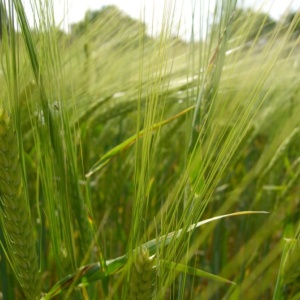
A new paper produced by a global group of agrosystem modellers, argues that if no action is taken to adapt, the future global wheat harvest is likely to be reduced by 6 % per each degree Celsius of local temperature increase. This would correspond to 42 million tonnes of yield reduction worldwide, which equals a quarter of current global wheat trade.
The researchers systematically tested 30 different wheat crop models against field experiments (where growing season mean temperatures ranged from 15 °C to 26 °C). They concluded that the year-to-year variability on yields due to reductions in warmer years and lesser reduction in cooler years, weakens the stability in grain supply. Variability and lack of stability of supply are critical from an economic perspective since they amplify market and price fluctuations. The researchers therefore argue that adaptation to climate change is crucial:
“Timely and adequate adaptation, such as cultivating more heat-tolerant wheat cultivars could substantially reduce climate change induced risks," says one of the lead researchers Prof. Dr. Reimund Rötter from Natural Resources Institute Finland.
The paper was produced by a global collaborative research team under the umbrella of The Agricultural Model Intercomparison and Improvement Project - AgMIP, coordinated by Columbia University, NASA and University of Florida, USA. Scientists from Finland, Germany, France, Denmark, Netherlands, Spain, UK, Columbia, Mexico, India, China, Australia, Canada and USA participated.
Abstract
Crop models are essential tools for assessing the threat of climate change to local and global food production. Present models used to predict wheat grain yield are highly uncertain when simulating how crops respond to temperature. Here we systematically tested 30 different wheat crop models of the Agricultural Model Intercomparison and Improvement Project against field experiments in which growing season mean temperatures ranged from 15 °C to 32 °C, including experiments with artificial heating. Many models simulated yields well, but were less accurate at higher temperatures. The model ensemble median was consistently more accurate in simulating the crop temperature response than any single model, regardless of the input information used. Extrapolating the model ensemble temperature response indicates that warming is already slowing yield gains at a majority of wheat-growing locations. Global wheat production is estimated to fall by 6% for each °C of further temperature increase and become more variable over space and time.
Citation
S. Asseng, F. Ewert, P. Martre, R. P. Rötter, D. B. Lobell, D. Cammarano, B. A. Kimball, M. J. Ottman, G. W. Wall, J. W. White, M. P. Reynolds, P. D. Alderman, P. V. V. Prasad, P. K. Aggarwal, J. Anothai, B. Basso, C. Biernath, A. J. Challinor, G. De Sanctis, J. Doltra, E. Fereres, M. Garcia-Vila, S. Gayler, G. Hoogenboom, L. A. Hunt, R. C. Izaurralde, M. Jabloun, C. D. Jones, K. C. Kersebaum, A-K. Koehler, C. Müller, S. Naresh Kumar, C. Nendel, G. O’Leary, J. E. Olesen, T. Palosuo, E. Priesack, E. Eyshi Rezaei, A. C. Ruane, M. A. Semenov, I. Shcherbak, C. Stöckle, P. Stratonovitch, T. Streck, I. Supit, F. Tao, P. J. Thorburn, K. Waha, E. Wang, D. Wallach, J. Wolf, Z. Zhao, Y. Zhu. Rising temperatures reduce global wheat production. Nature Climate Change, 2014; DOI: 10.1038/NCLIMATE2470
Read the full paper in Nature Climate Change here. Science Daily also has an article about the new research here.
You can find other related resources on our website by searching for the keywords climate change + wheat production.







Post a new comment »